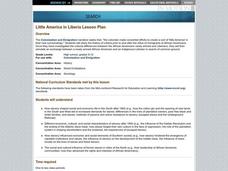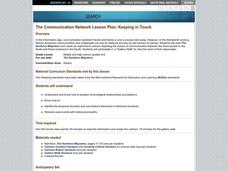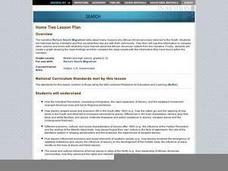Bill of Rights Institute
Freedom for All?
What did abolitionists have in common with those working for women's rights? How has the Native American struggle for voting rights differed from the struggles of other groups? Class members examine the 15th, 19th, 23rd, 24th, and 26th...
National Constitution Center
Explore Rights Around the World
How has the American Bill of Rights influenced the rest of the world? An interactive web activity helps individuals see the similarities between countries' bills of rights. A text-to-text tool compares the American Bill of Rights to...
San Antonio Independent School District
Colonies in the Americas
Compare and contrast the goals, types of government, interactions with Native Americans, and other important features of the Spanish, British, and French colonies in the Americas with this graphic organizer.
Scholastic
Thomas Jefferson and Monticello: An Introduction to Writing Historical Fiction
Thomas Jefferson is one of the most recognized names and faces in America—but is there more to the third president of the United States? Upper elementary and middle schoolers conduct research on Jefferson, his famous home at Monticello,...
Annenberg Foundation
Evaluating Evidence
Was the Civil War fought only due to slavery? Using an interactive web tool, scholars investigate the four main causes of the Civil War. Gathering evidence and data to support their claims, they present a final statistical breakdown...
ProCon
Penny
Twenty-nine percent of Americans want to abolish the one-cent coin, which begs the question: Is a penny saved really a penny earned? Scholars read fascinating facts about the history of the penny in preparation for a class debate or...
Curated OER
The Terrible Transformation: Freedom Denied
Pupils learn about the legal foundations for slavery and explore autobiographical writings of slaves. Students trace the development of laws that enforced the slave status of Africans and their descendants.
Curated OER
African American Emigration: Turner and McNeal
Learners discuss reasons why African Americans may have wanted to emigrate from the United States followig the Civil War. They complete a Venn diagram noting the differences between proposals by Marcus Garvey and Henry McNeal Turner.
Curated OER
Little America in Liberia
Students study the history of Liberia prior to and after the influx of immigrants of African Americans. They investigate the cultural differences between the African Americans and newly-arrived Liberians.
Curated OER
A Comparative Look at Migrations
Students explore and compare and contrast the migrations of African Americans in the United States in the decades before and after the Civil War.
Curated OER
Spirituals
Students review factors that contributed to the development of the spiritual, which reflects the influence of African religious and Christian traditions, and slavery. Students collect spirituals/songs of their heritage from family...
Curated OER
Forest Joe Lesson Plan: Outlaw or Hero?
Students become familiar with an American legend that is unfamiliar to many. Presented with the legend of Forest Joe, a runaway slave who, much like Robin Hood, stole from the rich to give to the poor, students draw comparisons and...
Curated OER
The Fugitive Slave Law and Migration
Students examine the Fugitive Slave Law as a motivating factor for slaves to emigrate outside the United States. After discussing the relationships between fugitive slaves and North American and Caribbean countries, they write essays...
Curated OER
Holding a Wolf by the Ears: Race, Economics, and the Complexity of Thomas Jefferson
Eleventh graders explore the era of slavery when Jefferson was President. For this United States History lesson, 11th graders participate in a class discussion that is led by the teacher. A PowerPoint presentation on the topic is...
Curated OER
Missouri's Early Slave Laws: Missouri's Early Slave Laws:
Students analyze and discuss various documents relating to slavery in Missouri in the 1830's and 1840's. They learn why some records are deemed to be of permanent, historical value to the state.
Curated OER
The Importance of Freedom
The students will become familiar with the Underground Railroad. They will gain an understanding of slaves and what it means to have little or no freedom and compare that with the rights that all Americans have now.
Curated OER
Boombox Classroom: Migration of Music
In this music worksheet, students complete two multiple choice questions about music moving from one culture to another. They write a sentence explaining why slavery is wrong. Students name types of music African-Americans brought with...
Curated OER
Who is Robert M. Glass? - Black History Month
Students research the role of African Americans during the each of the United States' wars. In this African American history lesson, students research information and statistics about the role of African Americans in the following wars:...
Curated OER
Keeping in Touch
Young scholars read about the Northern Migration of African Americans in the 19th century, and create an eight panel cartoon depicting the means of communication between freed slaves in the North and those still enslaved in the South.
Curated OER
Home Ties
Students explore the reasons people choose to migrate including political, economic and familial motivations. They interview family members and compare their ancestors own reasons for migration to those of African American urban migrants.
Curated OER
An Early Threat of Secession: The Missouri Compromise of 1820 and the Nullification Crisis
Students analyze an interactive map of the Missouri Compromise to identify the regions and their relation to slavery. In this pre-civil war era lesson, students read primary source documents and research online to answer questions...
Curated OER
The Abolitionist Movement: A Fight for Freedom
Sixth graders investigate the Civil War by identifying famous figures of the era. In this slavery abolitionist activity, 6th graders read a text on the history of the Civil War and discuss heroes of the era such as Harriet Tubman and...
Curated OER
The Embodied Presidency
Eighth graders examine the issue of slavery. In this Civil War lesson plan, 8th graders participate in a debate. Students evaluate the impact of slavery and war on the country.
Curated OER
Knowledge is Power
Students explore the distinct forms of knowledge that enslaved Africans brought with them to America or developed while enslaved. They study how political movements of the 18th century helped develop abolitionist thinking.
Other popular searches
- African American Slavery
- American Slavery Powerpoint
- Native American Slavery
- Pro American Slavery
- American Slavery Web Quest
- 13 American Colonies Slavery
- American Slavery Project
- Understanding American Slavery

























